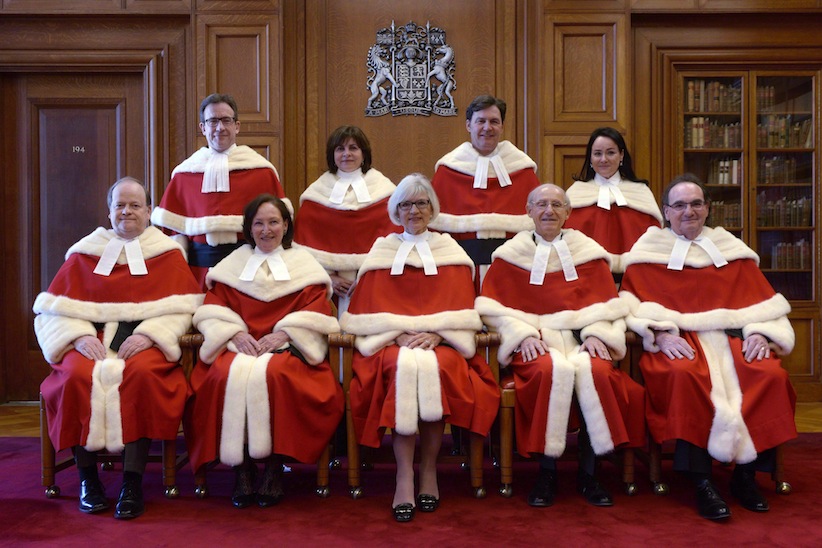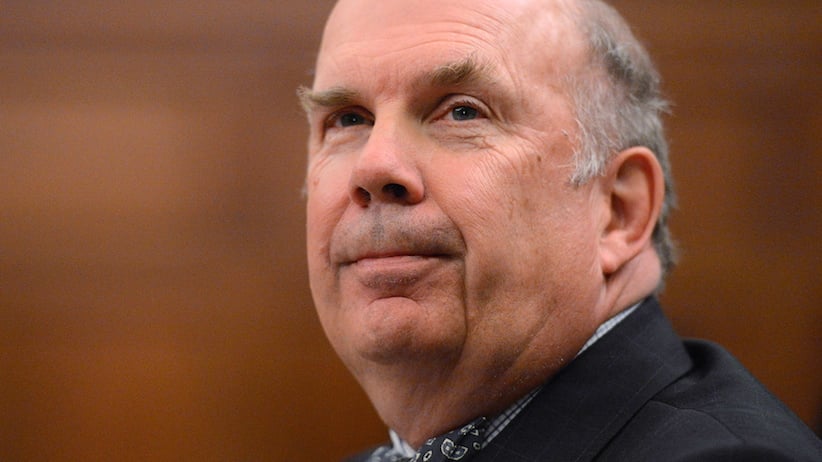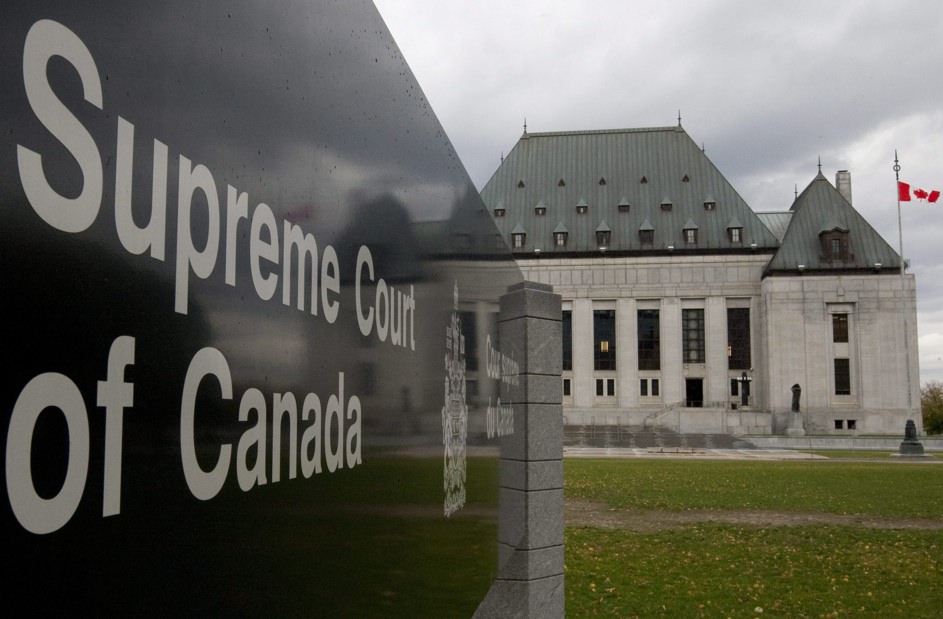Legal eagles: A roundtable about the Supreme Court appointment process
Four political scientists examine the government’s new Supreme Court appointment process from all angles, finding both upside and downsides
Ice coats tree branches outside of the Supreme Court of Canada Monday December 10, 2012 in Ottawa. Lawyers for eight Canadians challenging the outcomes of the last federal election in six closely contested ridings are in Federal Court this morning arguing that the results should be overturned because of alleged voter-suppression tactics.THE CANADIAN PRESS/Adrian Wyld
Share

The announcement that the federal government is set to enact reforms to how Supreme Court justices are appointed—a process that has been typically opaque and subjective to this point—has sent shockwaves through the legal field. That’s especially true for Troy Riddell, a professor at the University of Guelph, who has started a long email chain with his colleagues and frequent collaborators. Between the four, these legal experts have analyzed the ins and outs of what the process means, whether they represent improvement, and the potential dangers, both constitutional and beyond.
Dennis Baker, University of Guelph, Department of Political Science
There’s a lot to like in these reforms. Frankly, anything that makes public the secretive “consultations,” which we were always assured happened, is clearly a good thing. This Government deserves credit for making the process more transparent and open. That said, there are some areas for concern. For one thing, it seems as if the Government has jettisoned the convention that requires regional representation: three judges from Quebec, three from Ontario, two from Western Canada and 1 from Atlantic Canada. Justice Cromwell’s seat needs to be filled and earlier reports suggested that the Government has already tried to find a replacement from Atlantic Canada but hasn’t found one that is bilingual and meets its requirement for greater diversity. Instead of nominating a legally excellent candidate that didn’t fit its other criteria, the Government appears to have simply re-written the rules of the game by dropping the regional scheme. It is striking that regional representation wasn’t even mentioned at all as a form of diversity that the Advisory Board should pay particular attention. Amid all the good news about diversifying the bench, we need to recognize that the process initiated today means that Atlantic Canada might have lost its seat on the Supreme Court.
Does that matter? In many ways, the regional requirement could be seen as a proxy for other elements of diversity (particularly language and religion) and seems anachronistic for modern Canada. But, regardless of its merits, the regional requirement arguably has some constitutional force behind it and might require a constitutional amendment to alter it. This may even be more pressing with respect to the new bilingualism requirement. How would the Court rule? We might find out if one of the Atlantic Provinces refers the new process to its provincial Court of Appeal.
Matthew Hennigar, Brock University, Department of Political Science
The existing system for Supreme Court appointments—if we can even speak of such a thing, given how many different processes have been used over the past 15 years—certainly leaves much to be desired. The proposed changes admirably seek more transparency and visible diversity, though I am left with the discomforting feeling that once again the appointment system for our country’s highest court is the personal plaything of the Prime Minster. At the same time, I am well aware that more formal reform via constitutional amendment is exceptionally difficult and improbable.
To Dennis’s point about whether Trudeau’s changes are a “constitutional amendment” in light of the Nadon and Senate References, I think the answer is both yes and no: “yes” for now requiring bilingualism (it clearly wasn’t necessary before, and so is a fundamental change), “no” for altering composition issues rooted in convention rather than law. Following the line of argument in those two references cases, one might contend that regional representation on the SCC is a part of its fundamental “architecture” and so requires a formal constitutional amendment. But in those cases the architecture in question was contained in legal provisions—an appointed Senate in the BNA [now Constitution] Act, 1867, and the three Quebec seats on the SCC in the Supreme Court Act. In contrast, the “Atlantic seat”—and really, since Newfoundland and Labrador have never had representation on the Court, it’s more accurate to call it the “Maritime seat”—is a political convention. As a Nova Scotia native, I can’t say that I’m happy that the Atlantic seat might go to another region or group, even though I agree that the non-Quebec regional representation dimension of the court is somewhat anachronistic in 2016. Still, I think most people would agree that a Court composed of 6 Ontarians and 3 Quebecers, making rulings for all of Canada–including in matters of purely provincial law–would be politically problematic. As such, regional representation isn’t quite ready for the scrap heap yet.
MORE: Canada’s languages commissioner defends a bilingual Supreme Court
Dennis Baker
To the constitutional questions, I might argue these sorts of conventions are part of “the Constitution of Canada” and, if a change is in relation to the Supreme Court, especially its “composition,” it may require a constitutional amendment. I don’t necessarily like that outcome, but I think it is one the SCC has lead us towards.
It really depends on how much you read into the Nadon and Senate References – or perhaps how seriously you take them. I used to think the “eligibility requirements” in s.5 and s.6 of the Supreme Court Act were simply statutory provisions, but it turns out they are constitutionally entrenched. I’m not sure I’d write off “regional representation” as a plausible “fundamental characteristic” of the Court that can be easily discarded. Seems like it might easily be considered part of the “constitutional architecture” that the Court referred to in the Senate Reference.
Lori Hausegger, Boise State Univeristy, Department of Political Science
It will be interesting to see whether the current government is really suggesting moving away from the regional representation convention or if they might just ignore it for this particular appointment in order to make a high impact diversity appointment. The convention has been ignored before for brief periods (for e.g. the 1979 appointment of a British Columbia justice in an “Ontario position” that was rectified with the replacement of a retiring Alberta justice with an Ontario justice in 1982). However, I agree with Matt that it could be problematic if they do in fact move away from the regional convention. In a federal country as large as Canada I would argue that region is definitely part of diversity considerations and indeed polls have shown that region has played a large role in Canadian identity over the years. Courts are dependent on their legitimacy if for nothing else than to ensure implementation of their decisions. If regions of the country are unrepresented on the Supreme Court – particularly if that Court is making decisions on purely provincial law – it may affect the public’s opinion of the Court’s decisions and negatively impact perceptions of its legitimacy.

Matthew Hennigar
With respect to the new bilingualism requirement, I think Mr. Trudeau only gets into constitutional trouble if he tries to formalize it—simply exercising an executive preference for bilingual candidates is well within his power as PM. Admittedly, the formal/informal distinction can be blurry, but I would tend to view the specific, written directive to his Advisory Committee as closer to “formal”. “Informal”, in my mind, would be something like, “the committee recommends a list of otherwise qualified candidates, and the PM just happens to only pick bilingual ones.” As such, the Prime Minister is courting a constitutional challenge with the approach he has taken, though who exactly would bring the challenge is an intriguing question. As Dennis suggests, the most obvious candidate would be an aggrieved Atlantic provincial government, particularly Newfoundland and Labrador (I’d put even more money on that if Danny Williams was still the premier!). If not one of them, perhaps a rights advocacy group, or an individual lawyer like Rocco Galati in the Nadon case.
For what it’s worth, I’m more troubled by the excessive influence of the legal profession in the proposed process.
Dennis Baker
As for the formality, I agree that it isn’t as problematic if it is just the current PM’s “preference” but yes, Matt, this is getting pretty close to a formal policy, since the Advisory Committee can only nominate “functionally bilingual” candidates as per the written Terms of Reference the Government has provided. It isn’t statutory, but it’s pretty formal.
Lori makes a great observation about the temporary suspension of the regional convention with the appointment of Justice McIntyre in 1979, but I’d note that it was justified at the time, in part, as ensuring that one of the Western seats went to B.C.—regionalism met with more regionalism!
I certainly share Matt’s concerns about the dominance of the legal profession in the process. It seems natural that lawyers would play a leading role in the selection of judges, but there are lots of other voices that might be included as well: victims’ rights groups, police chiefs, business leaders and more community advocates. Lawyers are helpful to identify legal excellence, but we might want broader input on values and judgment.
Troy Riddell, University of Guelph, Department of Political Science
The dominance of the legal profession on the committee coupled with the other non-legal members appointed by the government is suggestive of the kind of candidates the government wishes to choose (and those whom they do not want to choose—namely those with more conservative ideology). The committee system is an improvement over the old system, but “politics” broadly defined will stay play a role. This is neither surprising nor necessarily undesirable given that the Supreme Court makes decisions that are value and policy laden and appointees arguably should reflect the social and political currents of the day. My guess is that at whatever future date another party forms the government there will be changes to the selection process to tilt it in a direction that more favours candidates of its liking.
On that note, I would be interested to know more about the impetus for greater diversity on the SCC bench. Is it just that the SCC should be more reflective of Canadian society (which is a commendable goal) or is the thinking also that members of different groups will make different kinds of decisions and bring different perspectives to the law? The government could use the latter argument to bolster its case against critics who might argue that they are potentially sacrificing merit for diversity—not only will candidates need to meet the highest standards for legal knowledge, communication skills and so on, but having diverse perspectives on the law and judicial process is itself meritorious.
Lori Hausegger
Troy and I know from our own work on lower federal courts, it is impossible to completely remove politics from the process even with a committee system in place. The person/group making appointments to that committee and the members they choose are influential on later evaluations of applicants. I do like the proposal to have three to five names forwarded to the Prime Minister. This is better than what happens at the court of appeal level where committees just rate the potential appointees and forward all the names to the Minister of Justice. If the Prime Minister commits to choosing someone from the list of three to five this serves as a better check than the lower court process. But the committee membership will influence which candidates makes the list. I’m not sure I agree with Troy that the announced committee indicates that the Trudeau government does not want to choose someone with a more conservative ideology. At least the representation of the Canadian Bar, the Canadian Judicial Council and the Federation of Law Societies—not to mention a progressive conservative as chair of the committee—suggests this is not the government’s main focus. However, I do think the committee’s membership indicates the government is very serious about fulfilling its goal of greater diversity. Studies suggest that diversity on the courts can matter. In particular issue areas scholars have found that female justices make different decisions than male justices – and having a female on the bench can influence a male justice’s vote on those issues. This has been found for race as well. Diversity brings different experiences and perspectives to the bench which can inform decisions. However, it can also be important just in terms of representation. Seeing someone “like you” (be it in terms of region, gender, race, language, or other identity important to you) can make the institution appear more accessible and more legitimate.

Dennis Baker
The Trudeau Government’s commitment to group diversity—“to achieve a gender-balanced Supreme Court of Canada that also reflects the diversity of members of Canadian society, including Indigenous peoples, persons with disabilities and members of linguistic, ethnic and other minority communities including those whose members’ gender identity or sexual orientation differs from that of the majority”—admirably seeks to improve diversity on the bench, but that may make regional representation even more difficult to achieve, especially in conjunction with the bilingualism requirement. It could be difficult to find a preferred candidate in what might be a small pool of candidates in some parts of the country. The timing of this change to the regional structure of the Court is also unfortunate, since it will affect a region that only has one seat. If it were one of Ontario’s three or one of the two Western ones, then you could make the case that, say, having the first Indigenous Justice was so important it warranted sacrificing a degree of regional diversity. But, in this case, all of Atlantic Canada can be shut out of Supreme Court representation and that’s the kind of majoritarian impulse we’re usually trying to curb.
Lori Hausegger
I think Dennis makes a good point here. However, there is another retirement coming up in 2018 and another in 2021 so perhaps the regions could be out of balance for a relatively short period of time if the government does pursue a historic appointment. This does bring up another point, that I think should be emphasized about the committee’s charge in the new process. The changes allow individuals to self-nominate themselves for the vacancy. However, if the real goal is diversity the committee may need to take their charge to “actively seek out qualified candidates and encourage them to apply” very seriously. Studies suggest success with increasing diversity may depend to some extent on women and minorities being encouraged to apply. Indeed, women typically need to be asked several times before they will put themselves forward for these kinds of positions. The suggestion is females often feel they are not quite “ready” while males rarely hesitate.
Matthew Hennigar
This may be a case of setting aside regional representation only temporarily to make room for an outstanding non-Atlantic pick, but if so the government could always clarify that up front—unfortunately, that might suggest to some that they already have a candidate in mind, which would contradict the government’s rationale that the reforms are to increase transparency.
Lori makes an excellent point about the dangers of relying on self-nomination. On a somewhat related point, although the prime minister characterized the existing system negatively as “a secretive backroom process,” some aspects of backroom consultation are perfectly reasonable. I see nothing wrong with asking the Chief Justice of the Supreme Court what specializations her bench needs, or quietly canvassing senior appeal court judges or leading judicial observers for input on who they consider the strongest jurists or most valuable colleagues. That type of valuable information is simply not available to laypeople, including most MPs, so I hope the committee will undertake such consultations as part of its mandate to seek out qualified candidates.
Troy Riddell
I agree with the importance of the committee taking its recruiting and consulting tasks seriously. However, I still believe that the odds of the committee forwarding the names of individuals with conservative legal philosophies is very slim. Organizations representing lawyers and judges tend to see themselves as “guardians” of the constitution—their vision of the constitution and the relationship between courts and Parliament is likely not as liberal as some activists would desire, but it is more liberal than what would be espoused by a conservative-oriented jurist. The overall result could be a lack of ideological diversity on the Supreme Court bench, which I think would be unfortunate.
We have spent so much time on the committee that we have not discussed the fact that MPs will have some opportunity to ask questions of the nominee. I appreciate past efforts to keep such sessions civil and without the partisan rancor of US Senate hearings, but this tended to leave us without the insights into a candidate’s views that one might expect from a legislative hearing. I’d like to see more of a middle ground with MPs getting more time to prep and more free reign to ask better and perhaps more difficult questions. Apparently there will be more prep time—at least a week rather than a couple of days—but it remains to be seen as to whether MPs will take advantage of more research time to ask more substantive questions.
Matthew Hennigar
Our colleagues Andrea Lawlor and Erin Crandall have a recent study that supports the conclusion that the parliamentary hearings of Supreme Court appointees did not generate very probing questions, which is not surprising given the strict limitations placed on the MPs and how little advance notice they were given. That said, I would note that the MPs flagged some of the problems that ultimately contributed to Nadon’s removal, if not the key issue about what qualifies as a “Quebec judge”. The committee couldn’t have actually blocked Harper’s ill-fated appointment in that case anyway, but I have always thought there is significant educational and political value in the hearings (particularly if they are well done), even if they lack veto power.
Dennis Baker
I agree—and we shouldn’t discount parliamentary hearings because they seem “boring” or uneventful. Their value might be in what they prevent: knowing there is a public hearing, where questions and concerns can be raised by the Opposition, might prevent some nominees from ever being selected in the first place. Prime Ministers can be certain that cronyism will be on full display.

Troy Riddell
Even if the parliamentary hearings are more vigorous and prevent the worst kind of cronyism, at the end of the day the Prime Minister still has the final say over the appointment—and after that there are no real mechanisms of accountability. Perhaps we should think about term limits for judges, as a number of other countries have around the world, particularly for appointees to their constitutional courts. (Of course, such a proposed change would raise the constitutional issues discussed above).
Speaking of constitutional courts, if I could indulge in fantasy for a moment, I would advocate the creation of one for Canada and allow for a diverse membership beyond the legal community. All cases that reach the Supreme Court are difficult and have value and policy implications, but Charter cases (and federalism ones) are qualitatively different in the degree to which they implicate political values and policy considerations. Questions revolving around physician assisted suicide, prostitution, abortion, the rights of the accused versus the power of the police, whether a province can unilaterally secede and many others are deeply political and involve complex policy issues. Why should addressing such questions be monopolized by lawyers? I do not fully buy the argument that legal training tends to homogenize viewpoints regardless of individual backgrounds; however, if we want greater diversity we may want to open up the review of legislation passed by parliament and the provinces to a body that includes non-lawyers (with term limits). While I am indulging in fantasy I could also suggest equipping this constitutional body with some tools to better formulate and evaluate policy. The council or court could, for example, employ trained social scientists to help members of the court better assess the myriad of social science evidence that is submitted in many cases. I’ll stop here before mentioning unicorns.
Matthew Hennigar
Such a change would be unicorn territory, but it is worth noting that systems for such courts are typically more partisan and involve more political actors than for “regular” courts, in recognition of the fact that the work of constitutional courts—like much of our Supreme Court’s caseload—concern matters that are implicitly political and involve contested value judgments. I think there’s a lesson in there for Canada. I’ll also repeat a line I often say to my students: any judicial selection system is political, so the question is whose politics should play the strongest role?
Lori Hausegger
One final note… as a political scientist who studies judicial selection my favourite part of the new process is the fact that the members of the advisory board, the assessment criteria and the eventual nominee’s questionnaire (or at least parts of it) will be made public. This kind of information helps scholars empirically study the process and its outcomes so that any reforms can be based on evidence rather than anecdotal stories.